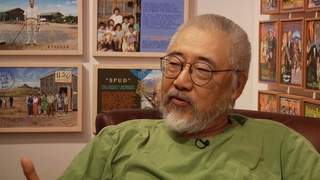Interviews
The riot in Manzanar
With all the unanswered questions going on and all these rumors, I guess there was a feeling that they were going to go down and protest and find out what the whole truth was at the administration. But this happened after dark...or, late in the afternoon, twilight-like.
And since there was so many of us down there, that’s when they brought the military police in. And when they came, they didn’t just come there. They set up machine guns and had I don’t know how many men. I couldn’t count them. But they were on the other side of the fence, and we were inside the fence. If it was just that way, I think, peacefully we could have gotten some answers and we could have all gone home.
But nobody from the administration came out, and we were just looking at each other. But the thing that was bad was, it was the dust storm. It was windy. And it wasn’t like summer time. It was already in the winter time, it was December. And when that dust storm kicked up, we all moved. We turned around and ran away.
But now, that caused commotion on the military side of it. So they thought that meant we were rushing them. That’s why those that got shot, got shot in the back. They were running away. That’s about as much as what happened then.
They threw tear gas, yeah, they threw tear gas. But that also caused more commotion, too. Not saying that, no, they shouldn’t have done that. What they shouldn’t have done was have the fire. We had no weapons, we had nothing.
Date: February 6, 2015
Location: California, US
Interviewer: John Esaki
Contributed by: Watase Media Arts Center, Japanese American National Museum

